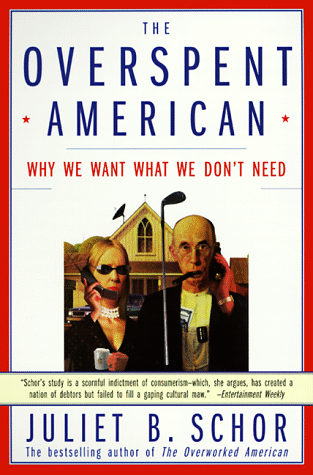 |
Home |
Catalogs |
Contact Us |

Books on:
Animal RightsBlack History
Clean Energy
Democracy
Eco Design
Eco History
Food and Nutrition
Genetic Engineering
Green Cities
Green Politics
Local Economics
Natural Building
Peace and Nonviolence
Simple Living
Trees and Forests
 |
The Overspent American
Upscaling, Downshifting, and the New Consumer
by Juliet Shor
253 pages, paperback, HarperCollins, 1999
Praise for The Overspent American
"Consuming more now and enjoying it less? In this heavily researched but accessible work, Schor (Womens Studies/Harvard; The Overworked American, 1992) tells us how and why this is so and what we might do about it. ``See-want-borrow-and-buy'' is Schor's succinct summation of American spending habits. As status and identity become increasingly indistinguishable, our very sense of worth becomes invested in what we buy. We spend billions for status. Given identical pairs of jeans, identical tubes of lipstick, we will more than likely buy, at a much higher price, the item with the designer label. Yet, such spending is self-defeating and never-ending. We no longer wish simply to keep up with our neighbors, but to emulate the spending habits of the richest 20 percent of Americans (television is the main vehicle through which we know what they buy). As their consumption increases, then, so does ours. The result of this endless game of catch-up is Americans working more, going increasingly into debt, but finding themselves no more happy or contented, in fact often a great deal less so. Further, as we spend privately our support for collective consumptionon education, social services, public safety diminishes, further eroding our sense of well-being. Its possible, but not easy given how natural it seems, to get out of this cycle of self-defeating consumption. Millions of Americans, whom Schor terms ``downshifters,'' have opted to work, earn, and consume less and in the process created richer, more meaningful lives. Schor supports all of these findings with abundant, perhaps overabundant, survey data." --Kirkus Reviews
Quotes from The Overspent American
"In the old days, our neighbors set the standard for what we had to have. They may have earned a little more, or a little less, but their incomes and ours were in the same ballpark. Their house down the block, worth roughly the same as ours, confirmed this. Today the neighbors are no longer the focus of comparison. How could they be? We may not even know them, much less which restaurants they patronize, where they vacation, and how much they spent for their living room couch.
". . . . the comparisons we make are no longer restricted to those in our own general earnings category, or even to those one rung above us on the ladder. Today a person is more likely to be making comparisons with, or choose as a "reference group," people whose incomes are three, four, or five times his or her own. The result is that millions of us have become participants in a national culture of upscale spending. I call it the new consumerism."
"When poet-waiters earning $18,000 a year, teachers earning $30,000, and editors and publishers earning six-figure incomes all aspire to be part of one urban literary referent group, which exerts pressure to drink the same brand of bottled water and wine, wear similar urban literary clothes, and appoint apartments with urban literary furniture, those at the lower economic end of the reference group find themselves in an untenable situation. Even if we choose not to emulate those who spend ostentatiously, consumer aspirations can be a serious reach."
"Oddly, it doesn't seem as if we're spending wastefully, or even lavishly. Rather, many of us feel we're just making it, barely able to stay even. But what's remarkable is that this feeling is not restricted to families of limited income. It's a generalized feeling, one that exists at all levels. Twenty-seven percent of all households making more than $100,000 a year say they cannot afford to buy everything they really need. Nearly 20 percent say they "spend nearly all their income on the basic necessities of life." In the $50,000-100,000 range, 39 percent and one-third feel this way, respectively. Overall, half the population of the richest country in the world say they cannot afford everything they really need. And it's not just the poorer half.
"This book is about why: About why so many middle-class Americans feel materially dissatisfied. Why they walk around with ever-present mental "wish lists" of things to buy or get. How even a six-figure income can seem inadequate, and why this country saves less than virtually any other nation in the world. It is about the ways in which, for America's middle classes, "spending becomes you," about how it flatters, enhances, and defines people in often wonderful ways, but also about how it takes over their lives. My analysis is based on new research showing that the need to spend whatever it takes to keep current within a chosen reference group -- which may include members of widely disparate resources -- drives much purchasing behavior. It analyzes how standards of belonging socially have changed in recent decades, and how this change has introduced Americans to highly intensified spending pressures.
"And finally, it is about a growing backlash to the consumption culture, a movement of people who are downshifting -- by working less, earning less, and living their consumer lives much more deliberately."
Table of Contents of The Overspent American
- Introduction
- Communicating with Commodities: How What We Buy Speaks Volumes
- The Visible Lifestyle: American Symbols of Status
- When Spending Becomes You
- The Downshifter Next Door
- Learning Diderot's Lesson: Stopping the Upward Creep of Desire
- Epilogue: Will Consuming Less Wreck the Economy?
Bibliography
Appendixes
Organizations
Notes
Index
Reader Comments |